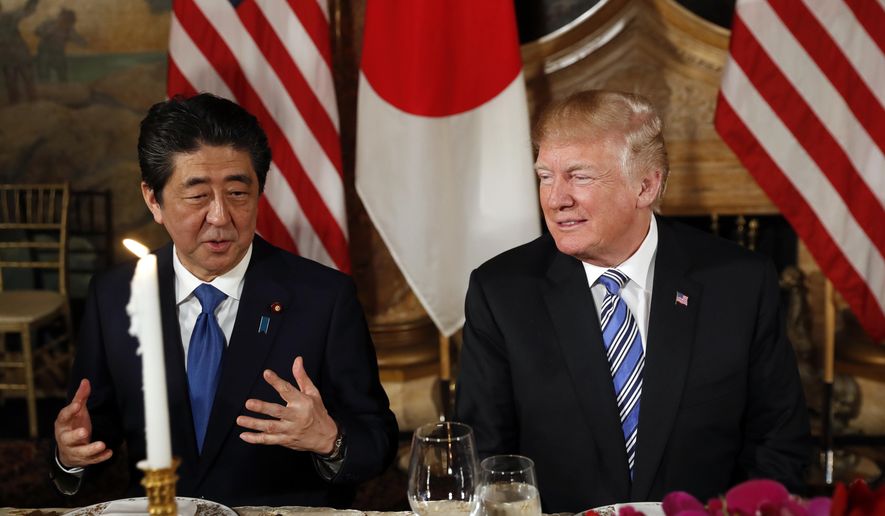President Trump and Japanese Prime Minister Shinzo Abe agreed in a phone call Monday to meet before Mr. Trump’s hoped-for summit with North Korean leader Kim Jong-un, as preparations continued for what the White House called the “expected” denuclearization talks.
The White House said the president and Mr. Abe will confer in person before the potential June 12 summit with North Korea, as they seek to “continue close coordination in advance of the expected meeting” between Mr. Trump and Mr. Kim.
“The president and prime minister affirmed the shared imperative of achieving the complete and permanent dismantlement of North Korea’s nuclear, chemical, and biological weapons and ballistic missile programs,” the White House said in a statement.
Mr. Abe told reporters in Tokyo that Mr. Trump briefed him on plans for the summit in Singapore, but he didn’t share any details. The prime minister, who met last weekend with Russian President Vladimir Putin, said he conveyed to Mr. Trump the support of Japan and Russia for the summit with North Korea to proceed.
The Japanese government wants to ensure that any agreement with North Korea addresses Pyongyang’s short-range missiles, which are a threat to Japan. Mr. Trump and Mr. Abe met last month at the president’s private club in Florida to discuss North Korea.
Mr. Abe also has been pushing Mr. Trump to raise with North Korea the unresolved issue of abductions of Japanese citizens over a period of decades. The prime minister met with families of abductees Monday and said he “conveyed their feelings” to Mr. Trump.
“I told him that it’s absolutely necessary to resolve the issue,” Mr. Abe said.
The U.S., North Korea and South Korea worked through the weekend and Monday to move forward with the denuclearization summit, after Mr. Trump canceled it last Thursday, citing Pyongyang’s “open hostility” toward the U.S. Since then, the American president has said he’s reconsidering.
South Korean President Moon Jae-in said Monday there could be more impromptu talks and summits with Mr. Kim, after the two men held their own surprise meeting Saturday at the border village of Panmunjom. During that meeting, they agreed that a North Korea-U.S. summit must be held.
“What’s more important than anything from the latest inter-Korean summit was that the leaders easily got in contact, easily made an appointment and easily met to discuss urgent matters, without complicated procedures and formalities, just like a casual meeting,” Mr. Moon told a meeting with senior secretaries.
On Sunday, the State Department said U.S. and North Korean officials had met at Panmunjom in the Demilitarized Zone that runs along the heavily armed border between North and South Korea.
A “pre-advance” team of U.S. officials was also traveling to Singapore to meet with North Koreans there, the White House said.
Asian stocks and U.S. share futures gained on Monday, while shares in South Korean construction and railway firms surged after Mr. Trump said his officials and North Korea have resumed talks to prepare for the summit in June.
Shares of Shinwon Corp, which used to operate factories in the Kaesong industrial region near the DMZ, jumped 22 percent, while Hyundai Engineering & Construction gained 24 percent.
A U.S. official told Reuters that Sung Kim, the former U.S. ambassador to South Korea, was leading the American delegation to meet North Korean officials at the border.
“It’s a good thing to have him onboard,” said a former senior South Korean official who worked with Sung Kim in the past. “He’s capable, level-headed, cautious, and has solid grasp of the issues and knows North Koreans well. But at the same time, he has healthy skepticism.”
Pentagon official Randall Schriver was also part of the U.S. team, the U.S. official said. The U.S. delegation also included Allison Hooker, the Korea expert on the White House National Security Council.
After weeks of political posturing by both Mr. Trump and Mr. Kim, analysts welcomed the news the U.S. had dispatched a team of seasoned negotiators to hold several days of preparatory talks with the North Koreans.
“Sending such an experienced and professional team signals that the Trump administration is getting serious about the specifics of an agreement,” said Abraham Denmark, former U.S. deputy assistant secretary of defense for East Asia. “It’s also an implicit acknowledgment that running this negotiation out of the Oval Office has not worked, and that lower-level officials are needed to work out the details before a summit can take place.”
Still, with only a few weeks left until the scheduled summit, such talks are unlikely to reconcile the differing positions over Pyongyang’s nuclear arsenal, he said.
“No matter how experienced and knowledgeable these officials are, they will not be able to change the fundamental challenge between the United States and North Korea over its status as a nuclear power,” he said.
• This article is based in part on wire service reports.
• Dave Boyer can be reached at dboyer@washingtontimes.com.




Please read our comment policy before commenting.